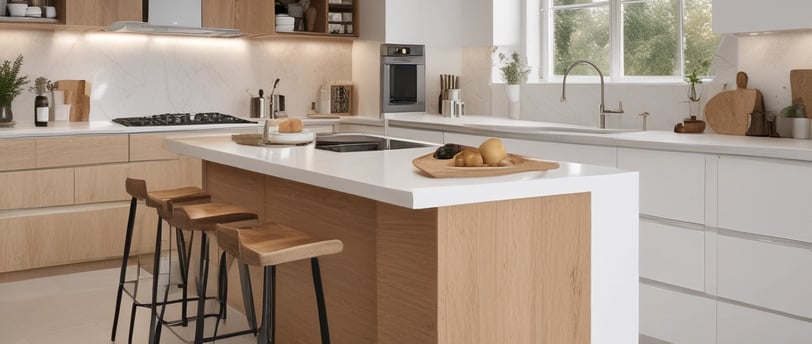The Ultimate Guide to Choosing Your Kitchen Countertop: Pros and Cons of Different Materials
2/6/20252 min read


Introduction
Choosing the right kitchen countertop is a crucial decision for homeowners and chefs alike. With a myriad of options available, each material presents unique advantages and disadvantages. In this guide, we'll discuss the most common countertop materials—wood, quartz, quartzite, granite, and marble—focusing on their durability, price, installation, and maintenance.
Material Comparison: Wood, Quartz, Quartzite, Granite, and Marble
Each countertop material varies significantly in terms of durability and maintenance. Wood countertops provide a warm, natural appearance but may require frequent sealing and are susceptible to scratches and water damage. In contrast, quartz countertops are engineered for durability. They are non-porous, resistant to stains, and require minimal maintenance, making them an appealing choice for many.
Granite and quartzite offer excellent durability as well. Both materials are heat and scratch resistant, ideal for busy kitchens. However, granite requires periodic sealing to maintain its integrity, whereas quartzite is more naturally resistant. Marble, while aesthetically stunning and a preferred choice for bakers due to its cool surface, is less durable and more prone to scratching and staining.
Cost Considerations
When comparing the price of countertop materials, it’s essential to factor in both the initial cost and long-term value. Wood countertops generally fall on the lower end of the price spectrum but can incur additional costs for sealing and maintenance. Quartz countertops are typically more expensive upfront due to their engineered composition. Granite and quartzite usually carry a higher price tag due to their natural origins and the complicated extraction process. Marble is often the priciest option, especially for high-quality slabs.
Installation and Maintenance
Installation can also vary with each material. Wood countertops can be relatively straightforward to install. In contrast, natural stone options like granite, quartzite, and marble often require professional installation due to their weight and the need for precise cutting. Maintenance routines differ significantly, with wood needing regular sealing, while quartz and quartzite require less frequent upkeep. Granite countertops should be sealed to prevent staining. Marble demands regular cleaning and attention to prevent etching from acidic substances.
Conclusion
Overall, selecting the right countertop material depends on your personal priorities and kitchen lifestyle. If durability and low maintenance are essential, quartz or granite may be your best options. For a classic and elegant look, consider marble, but be prepared for the care it requires. Understanding the pros and cons of wood, quartz, quartzite, granite, and marble will help you make an informed decision, ensuring your kitchen not only looks great but functions flawlessly for years to come.
